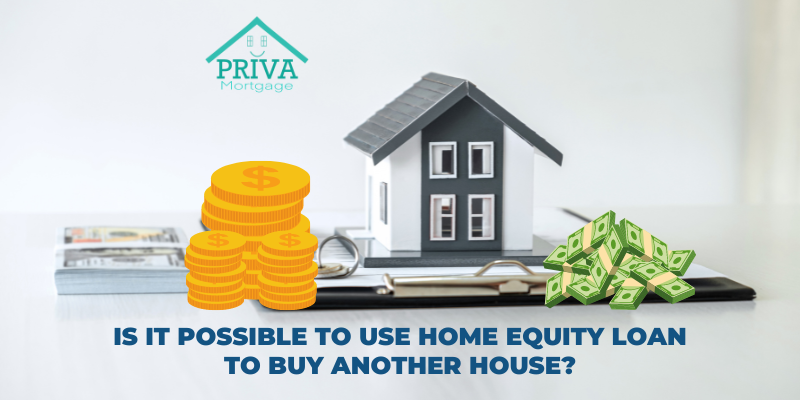If you want to buy another house, you’ll need money for a down payment and to qualify for financing on the second home. You may need to look at alternatives if you don’t have the cash handy.
Most lenders require a larger down payment on a home that’s not your primary residence. If you don’t have the capital available, you might consider tapping into your current home’s equity.
Here’s everything you must know about using a home equity loan to buy another house.
Can you Get the Down Payment Using your Home’s Equity?
It is possible to use home equity for a down payment on another home; however, you must qualify. Not every homeowner will have enough equity or the qualifications to use their home’s equity.
Here’s how to qualify.
Using Home Equity to Buy Another House
To use your home’s equity, you can typically tap into up to 80% of the home’s value. From that amount, you must deduct the outstanding mortgage you already have that you used to buy the house.
For example, if your home is worth $400,000, you can have a total of $320,000 in loans between your first mortgage and a home equity loan or HELOC. If your first mortgage has a $200,000 balance, that leaves $120,000 as a potential second mortgage.
To meet the requirements for a home equity loan or line of credit, you must prove the following:
- You have decent credit that qualifies you for the loan (usually 660+)
- Your debt-to-income ratio is low enough to afford the new mortgage
- You have stable income and employment
- Your home’s value supports the home equity loan or HELOC
Keep in mind if you’ll need financing on the new home you’re buying, it will affect your debt-to-income ratio further. For example, if you’re using your current home’s equity for the down payment but must finance the remainder of the sales price, you’ll have three mortgages to pay monthly.
How a Home Equity Loan and HELOC Work
When borrowing money from your home’s equity, you may choose from a home equity loan or HELOC. Here’s the difference.
Home Equity Loan
A home equity loan is a fixed-interest rate loan. You receive the funds in one lump sum and immediately make principal and interest payments.
The home equity loan often makes sense when using your home’s equity to buy another home because you need the funds in one lump sum. In addition, you get a fixed interest rate and can more easily budget for your second mortgage payment.
The downside, however, is your payments will be higher from the start. You’ll owe principal and interest on the total amount borrowed.
HELOC
A home equity line of credit is a second mortgage with a variable interest rate and a revolving line of credit. You can withdraw the funds in one lump sum or gradually as needed.
A HELOC is best for situations when you’ll need money in phases, such as a down payment and then money to furnish or renovate the home.
HELOC payments aren’t as easy to budget because the interest rate changes monthly; however, you only owe interest payments for the first ten years. After the draw period (ten years), you then owe principal and interest payments on the outstanding balance.
Because the payments are lower for the first ten years, it can be easier to afford all three mortgage payments. In addition, if you’re nearing the end of the term on your first mortgage, it could free up capital to make principal and interest payments on the HELOC in ten years.
Other Ways to Get Cash to Buy Another House
If you don’t have the equity in your home, or you don’t want to touch it, other options include:
- Cash – If you have liquid savings, you can use the funds as your down payment on another house. You’ll likely need 20 – 30% down on a home that isn’t your primary residence.
- Cash-out refinance – A cash-out refinance is a refinance of your first mortgage, but for a larger amount. You tap into your home’s equity but with your first mortgage. You’ll receive the difference between the new loan amount and your existing loan payoff to use for the down payment.
- Personal loan – An unsecured personal loan may be an option; however, they usually have higher interest rates and lower loan amounts because there’s no collateral.
- Retirement savings – If your retirement plan allows you to borrow from the balance, you can borrow the funds for a down payment and repay yourself, including interest.
Pros and Cons Home Equity Loans to Buy Another House

It’s important to consider the pros and cons of a home equity loan for a down payment on another house before deciding.
Pros:
- Interest rates on home equity loans or HELOCs are competitive
- You don’t have to use your liquid cash to buy another home
- Home equity loans and HELOCs are easy to qualify for
Cons:
- You put your primary residence at risk of foreclosure if you can’t afford the payments
- Increasing your debt-to-income ratio significantly can be risky if you lose your job or fall ill
- You’ll pay closing costs on the home equity loan and your financing for the new home
Bottom Line
Using home equity to buy another home is possible, but consider your options carefully. For example, adding a mortgage means more financial responsibility, and because mortgages are secured, you put your home at risk.
Before borrowing money to buy another home, ensure you can comfortably afford all mortgages so you don’t put any properties at risk of foreclosure.







